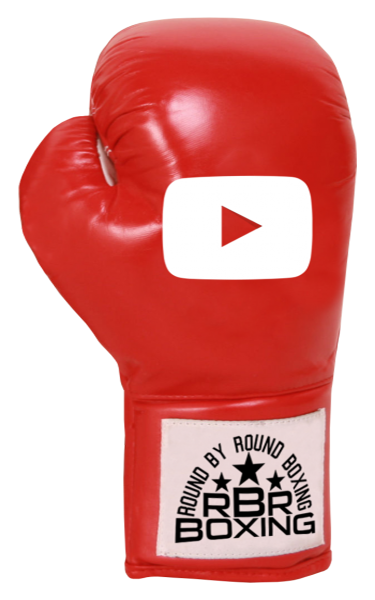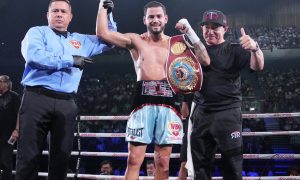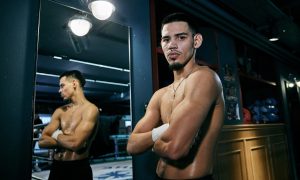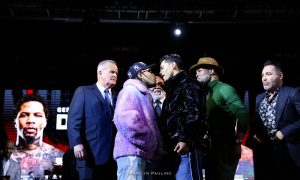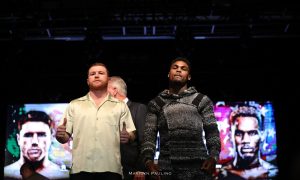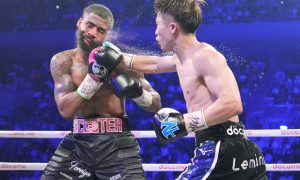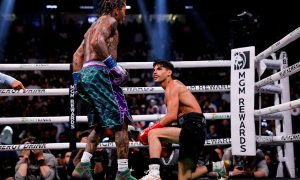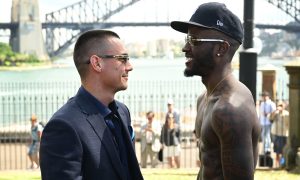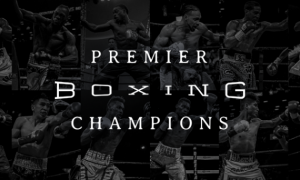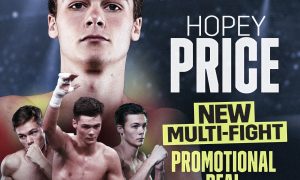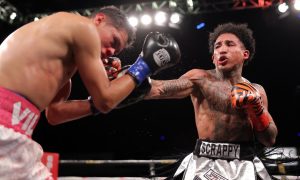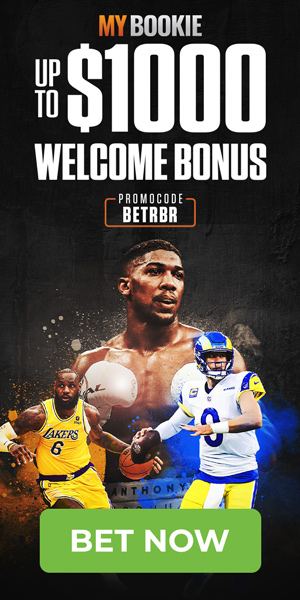FREDDIE ROACH AND TEDDY ATLAS: POINT COUNTERPOINT
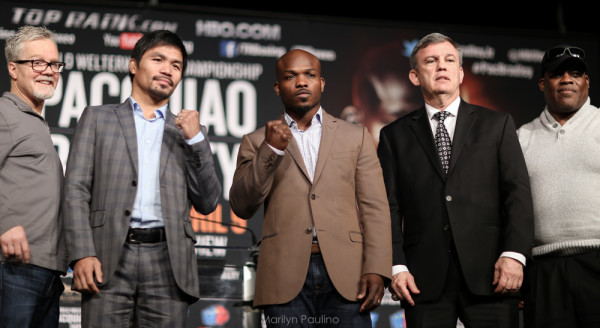
By Bill Dwyre
The TV images from boxing last Saturday night were of a glassy-eyed Jean Pascal and a worried Freddie Roach.
It was the end of the sixth round of the light heavyweight title fight between Pascal and Sergey Kovalev in Montreal, Pascal’s hometown. They had fought before. Kovalev had destroyed Pascal. Pascal wanted another shot and hired the seven-time trainer of the year to guide him through the firestorm this time.
Now, Roach was doing the only kind of guiding left. No need for instructions about jabbing, nor ducking and countering. In the corner, he was telling Pascal it was over. Roach was doing his best Roberto Duran. No mas, Jean.
This then, as we continue to preview the upcoming battle April 9 between MANNY “Pacman” PACQUIAO and TIMOTHY “Desert Storm” BRADLEY JR., triggers a discussion of boxing trainers’ responsibility, humanity and common sense.
Roach and Pascal were a one-off. Roach did his best with the former champ, but knew that Kovalev was an unforgiving, unyielding beast. If you are in Kovalev’s division, you face a choice of fighting him, or standing in front of a speeding train.
Roach told Pascal he was going to stop the fight. Pascal objected. He wanted one more round. Of course he did. Boxers are trained to be gladiators, to battle to the death. In this case, that was not a far-fetched concern.
Pascal was done, shot, beaten up. As much of a wild-swinger as he can be, his chances of catching Kovalev with a knockout punch were the same as his chances of being elected Pope. Roach knew that. He painted the picture for Pascal. “You can get hurt badly. I can’t let that happen.”
But he almost did. Roach let him go. Pascal showed brief glimpses of new energy, but it was mostly because Kovalev allowed him to, actually seeming to want Pascal to keep fighting so he could torture him further.
When the round ended, Roach went to Referee Michael Griffin and asked him to stop it. Was that a round too late?
As in most things with Roach, there is an interesting back story. He sat in his Wild Card Gym in Los Angeles this week and spelled it out, amidst the ever-present background of squeaky boxing shoes and mitts hitting bags. His approach to stopping fights — when you do it, how you do it — was shaped in 2008, when he watched Pacquiao beating up on a marvelous, but aging, Oscar De La Hoya.
“I learned, from Oscar’s trainer (Nacho Beristain), what not to do,” Roach said. “Nacho said to Oscar in the corner, ‘I’m going to stop the fight, OK?’
“You can’t do that. The ‘O.K.’ would never work. Here you had the highest earning pay-per-view boxer on the planet and Nacho is asking him, on national TV, to agree to quit. No fighter will do that. It’s the trainer’s responsibility.”
Which immediately raised the question of whether, with Pascal, Roach followed his own philosophy, as learned from Beristain.
“I probably should have stopped the fight when he begged me not to,” Roach said. “But I feel that, in a world title fight, my responsibility is also to give my fighter one more chance.”
Roach also said he did something he had never done before.
“Before I let him go out for that last round,” he said, “I went to the ref and told him to keep an eye on Pascal. Usually, when you say that, they stop the fight right there. When I stopped it after that last round, the ref (Michael Griffin) told me I had done the right thing.”
Roach admitted he was worried he had done the wrong thing by letting Pascal go out one more time, and that’s why he brought Griffin into the moment. He was hedging his bets, in essence asking the referee to share the responsibility. He admitted that.
Teddy Atlas, much more than just an interested party, was watching on TV. He will be in Bradley’s corner April 9. It will be the first time he and Roach have ever faced off against each other from opposite corners.
Atlas, a former Trainer of the Year in his own right, has lived this stoppage of fights, and is steadfast in his beliefs.
“You have to know your fighter,” he said. “You start making that decision before you even agree to train him. And then, when it’s time to make a fight, you ask yourself if that fight makes sense. Should we even go forward?”
Atlas talked about two situations.
In one, he stopped a fight, even when his fighter had been checked by the referee and allowed to continue.
“It was in the Felt Forum, Madison Square Garden, probably 30 years ago,” Atlas said. “The referee was shocked. He didn’t know the fighter like I did. How could he? The fighter was angry. When I went to put my arms around him, comfort him, I could tell he didn’t have his legs, that he had no control.
“It was my responsibility to recognize that.”
The fighter wanted to continue his career. Atlas said no. The fighter got another trainer and was about to get in the ring again. Atlas no longer had control, but was still worried. He had heard that the fighter got knocked out during training camp. The fighter needed a physical to renew his license before the fight. Word got back to Atlas. The doctor doing the physical wouldn’t allow the fight and said the result could have been fatal.
“I had another fighter going for the super middleweight title in Germany,” Atlas recalled. “By the 11th round, he was cut up pretty bad. He hadn’t been down, but he was hit with a lot of punches. And he didn’t have any zip on his. I just wasn’t going to let him take any more punishment, so I stopped it. There was no point. He couldn’t win.”
That boxer was “25 or 26,” Atlas said, and at his suggestion, the young man never fought again.
“He trusted me,” Atlas said. “I felt like I did my job. It saddened me, because I knew he would not reach the boxing goals he had set. He had been something like 17-0 at one point, but things change. It’s a tough sport. You cannot be one of those guys who just keeps going, no matter what.”
Atlas never took his payment for that fight. When the boxer had a son, Atlas was asked to be the godfather.
“That made me feel good about everything,” Atlas said.
Atlas agreed with Roach’s philosophy on stopping fights.
“On that, Freddie is 100% correct,” he said.
He didn’t necessarily agree that Roach had followed his own rules with Pascal.
“What’s good for the goose is good for the gander,” Atlas said. “He should remember what he said about Nacho. Thank god nothing bad happened, because the guy [Pascal] didn’t have a chance.”
One thing is clear. There will be no hesitation when Pacquiao and Bradley fight. Pacquiao and Roach are like father and son. Pacquiao has said numerous times that, if Roach sees him slipping and tells him so, he will quit.
Atlas and Bradley, in just one training camp and one successful fight against Brandon Rios, have also become like family.
“I see Timmy as a person first,” Atlas said, “and after that, as a fighter.”
Expect a good fight. Expect correct decisions from both corners. Better yet, hope no such decisions are needed, that the fighters, referee and judges take care of that.
Photos by Marilyn Paulino/RBRBoxing



